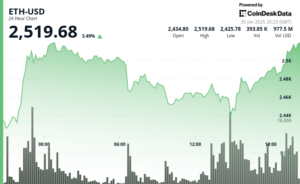A scammer behind the ZKasino rug pull has lost over $27 million in a high-risk Ethereum trade as crypto market turbulence continues.On April 7, it was revealed that the scammer had exited a 20x leveraged long position on ETH using the Hyperliquid trading platform.This setback is believed to have been caused by Ethereum’s recent price correction amid the broader market slump triggered by the US implementing reciprocal tariffs on 180 countries.
According to CryptoSlate’s data, Ethereum fell almost 20% over the last 24 hours to as low as $1415 before attempting a recovery above $1500, currently trading at $1537 as of press time. Many in the crypto space view the scammer’s recent trading loss as a “dose of karma.” This loss echoes a case from March 31, when the hacker behind the $9.6 million ZkLend exploit lost 2,930 ETH to a phishing site mimicking Tornado Cash. The individual had also ignored a bounty offer from ZkLend.
The funds used in the trade are believed to stem from an earlier exploit tied to ZKasino, which occurred in 2024. The platform faced backlash after executing a rug pull that drained almost $33 million worth of Ethereum from users. Ethereum co-founder Vitalik Buterin criticized the project, claiming its use of “ZK” branding was misleading and solely based on its deployment on zkSync. ZKasino promised to refund investors’ funds while claiming it acted in users’ interests by converting the ETH to ZKAS tokens and locking them under a 15-month vesting schedule. However, the promised refunds have not materialized.
The Netherlands’ Fiscal Information and Investigation Service (FIOD) later arrested a 26-year-old man suspected of involvement in the scheme, seizing digital assets, luxury cars, and real estate worth approximately $12.2 million. Authorities are cracking down on fraudulent activities in the crypto space, highlighting the risks involved in overleveraged trading and scams like the ZKasino rug pull. Crypto investors need to be vigilant and cautious when engaging in high-risk trading to avoid falling victim to such scams and losing significant amounts of money in the process.

















